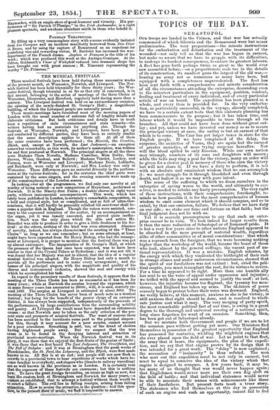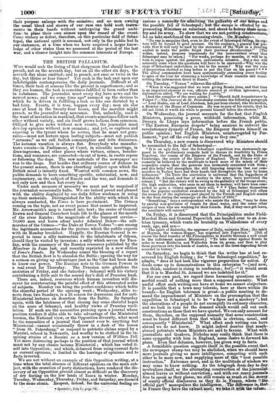TOPICS OF TIE BAY.
SEBASTOFOL.
the principal victory at once, the outlay is but an earnest of that which is to come. The Czar has yet larger taxes in store for the English people. If we have complained of the delay, the suspense, the anxieties of Varna, they are again but the earnest of greater anxieties, of more trying suspense hereafter. Nor will the blood spilled be only Russian. While our own nation may triumph, numbers of its sons and daughters will mourn; while the bells may ring a peal for the victory, many an order will be given for a slower peal in memory of those who earn the victory but will not share it. If we have a duty to perform, it is not with an absolute and omniscient wisdom that we can accomplish it: we must struggle for it through bloodshed and even through doubt, and hallow it as we may with pure intent. The sense of the suffering to which we doom ourselves in the enterprise of saving worse to the world, and ultimately to our- selves, is needed to rebuke any hasty presumption. The very sight of these instructions, with their comprehensive forethought, re- minds us how possible it is for the most comprehensive of humaa wisdom to omit some element which it should compass, and so to entail, by that one omission failure. We believe that we have duty
on our side ; we stake our fame and fortune on that faith; but the final judgment does not lie with us.
Yet it is scarcely presumptuous to say that such an enter- prise cannot be in vain. We look indeed for larger results from it than the mere reduction of Sebastopol or of Ronianoff pride. It is but a very few years since to other nations England appeared to be absorbed in the mere pursuit of material wealth, regardless alike of other communities or of moral considerations: that which was a reproach from the foreigner, that we were becoming nothing higher than the workshop of the world, became the boast of those who took, almost by the general suffrage, the vacant post of na- tional representatives. It was a mistake. English colonies, by the energy with which they vindicated the birthright of their race in strange climes and under unforeseen circumstances, showed that the spirit of our forefathers was not extinct : but, cried the poli- tical sceptic, you must transplant the root, for its virtues to revive. For a time he appeared to be right. More than one humble ally has sent to us the voice of appeal under oppression and injustice ; we trifled with the appeal and seemed to justify the scoff; at last, however, the injustice became too flagrant, the tyranny too mon- strous, and England has taken up arms. The idolaters of peace scarcely began to protest before their voice was drowned. England, we verily believe, at this moment, anxious as she is for victory, is still anxious that right should be done, and is resolved to vindi- cate justice cost what it may. The very merging of party-spirit, the most remarkable political fact of our time, is owing in a great degree to the thorough and universal rousing of a national spirit, long since forgotten for want of an occasion. Something, then, has been got out of Sebastopol already. But we mistake both Government and people if we are to let the occasion pass without getting yet more. Our Ministers lind themselves in possession of the greatest opportunity that England has possessed for centuries, wielding the mightiest engines that she ever placed upon the field of war. Let us point to that fleet, the army that it bears, the equipments, the plan of the expedi- tion, and we say that that engine proves by its design that it was intended for a great work. The "delay" is now explained; the accusation of " insincerity " is thus 'refuted. The men who sent out this expedition must be not only in earnest, but must be equal to conceive the idea of the victory which that engine is designed to compass. A. few years back, it may be, too many of us thought that war would never happen again; that Englishmen would never more see their own flag aloft on the field of battle ; and that individual statesmen would never be able to associate their names with achievements like those of their forefathers. But present facts teaeh a truer ,stery. The statesmen who find themselves at this day in possession of such an engine and such an opportanity, cannot fail to feel OUR troops are landed in the Crimea; and that war has actually commenced of which Silistria and the Bomarsund were but minor preliminaries. The very preparations—the minute instriuitions for the embarkation and debarkation and the treatment of the wounded—not only tell us that the war has begun in earnest, but make us aware that we have to grapple with its difficulties, to undergo its hardest consequences, to endure its greatest labours. A fleet has gone forth perhaps twice as great as the world ever saw assembled before,—on a proportionate scale too in the details of its construction, its smallest guns the largest of the old war,— bearing an army not so numerous as many have been, but equipped with a completeness unprecedented. The fleet has been sent forth with a comprehensive and minute consideration of all the circumstances attending the enterprise, descending even to the minutest particulars in the equipment, position, conduct, feeding and treatment of every individual, and of every particular article of war on board. The expedition has been planned as a whole, and every item is provided for. In the very embarka- tion, so particularly successful, in the voyage, already completed, we have to a certain extent tests that this elaborate planning has been commensurate to its purpose ; but it has taken time, and labour which it would be impossible to trace through all its branches. All that could not have been done without great out- lay ; and yet, unless we have invested our money so as to secure their piirpole eilarge- with thee *Auden e and: nie men ',veiling the -usual blood and sinews of 'ourerace eari.hold. Such testru- meiets the bands without .undergoing the grand • ambi- tioneta plane .their own ,nlimesi Open Um' record of the event. Come victory-or defeat, thereto*, on this particular field of Sebas- topol,- the national spirit is aroused, *not-only in the public but In out-statesmen, at a time when we have acquired a larger know- ledge of other states than we possessed: at the period of the last war, and a clearer insight into the common interests of Europe.



























 Previous page
Previous page